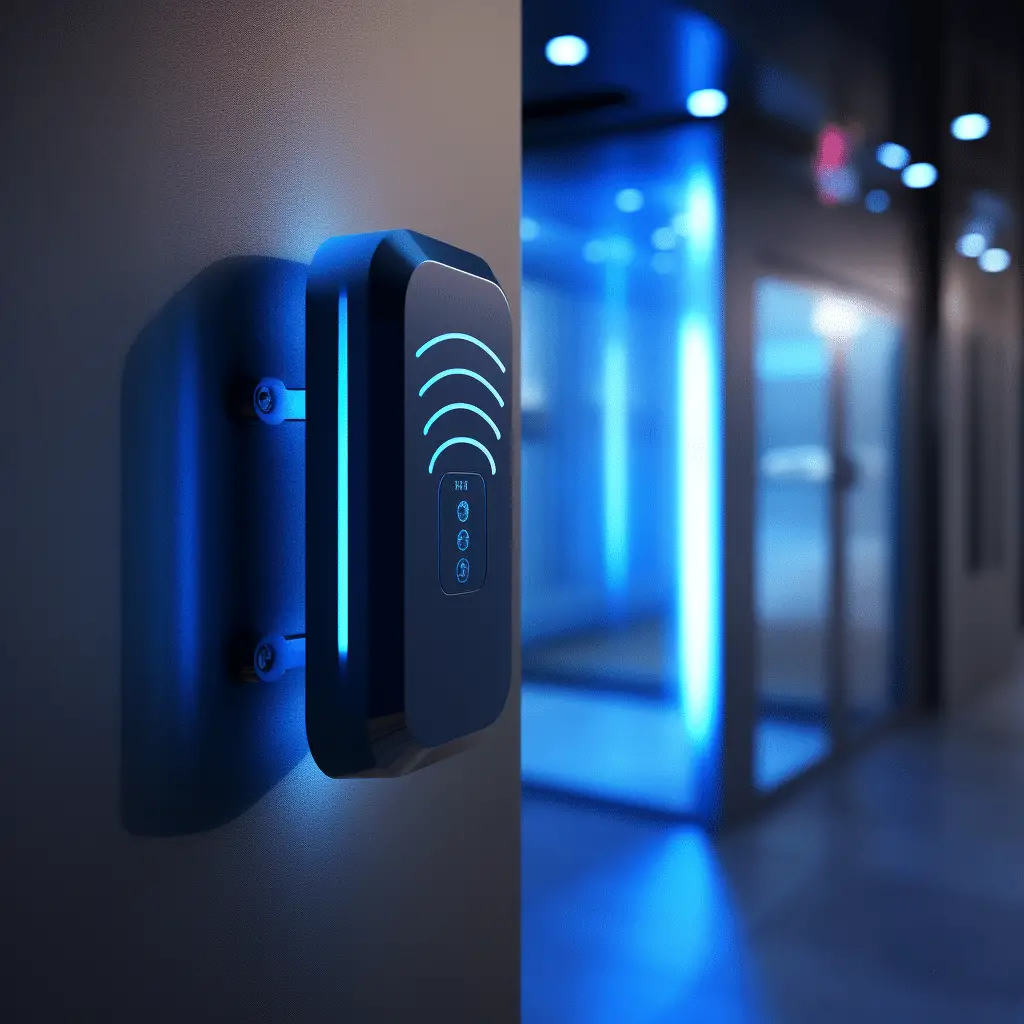A home security system is a comprehensive network of devices and technologies designed to protect your property and its occupants from unauthorized access. It consists of various components such as control panels, security cameras, door and window sensors, motion sensors, alarm systems, smoke detectors, carbon monoxide detectors, and video doorbells. Wired systems use wires or cables to connect the components, while wireless systems use radio frequency to communicate. Wired systems offer reliability and a constant power source, while wireless systems provide flexibility and easy installation. The choice between wired and wireless access control systems depends on your specific needs and preferences.

Key Takeaways:
- Wired access control systems use wires or cables to connect components, while wireless systems use radio frequency.
- Wired systems offer reliability and a constant power source.
- Wireless systems provide flexibility and easy installation.
- The choice between wired and wireless access control systems depends on specific needs and preferences.
Pros and Cons of Wired Access Control Systems
When considering access control systems, it’s important to weigh the pros and cons of wired options. Wired access control systems offer several advantages, including reliability and stability. Since they do not rely on wireless transmissions, they are not susceptible to interference from other devices or signal disruptions. This makes them a secure choice for properties where data security is a top priority.
Another advantage of wired systems is the constant power source they provide. Unlike their wireless counterparts that rely on batteries, wired systems are powered through a direct electrical connection. This eliminates the need for regular battery replacements and ensures uninterrupted operation.
However, there are some downsides to consider as well. The installation process for wired systems can be more complex and expensive compared to wireless alternatives. It often requires professional assistance, as it involves wiring and connectivity tasks. Once installed, making changes or modifications to the system may also be more challenging due to the fixed physical connections.
Pros and Cons of Wired Access Control Systems:
| Pros | Cons |
|---|---|
| Reliable and stable | Complex and expensive installation |
| Secure transmission of data | Challenging to make changes or modifications |
| Constant power source |
Overall, wired access control systems offer a reliable and secure option for property owners who prioritize stability and data security. However, the complexity and cost of installation, as well as the limited flexibility for system modifications, are important factors to consider when deciding between wired and wireless access control solutions.
Pros and Cons of Wireless Access Control Systems
Wireless access control systems offer several advantages and disadvantages compared to their wired counterparts. It is important to consider these factors when deciding which type of system best fits your security needs.
Advantages of Wireless Access Control Systems
- Easy Installation: Wireless systems are quick and straightforward to install compared to wired systems, as they do not require extensive wiring.
- Flexibility: With wireless systems, you have the freedom to place components wherever they are needed most, without being constrained by wiring limitations.
- Expandability: Wireless systems can be easily expanded or modified as your security needs change. You can add or remove components without the hassle of rewiring.
- Cost-effective: For smaller installations, wireless systems can be more cost-effective than wired systems, as they often come in affordable kits with all the necessary components.
Disadvantages of Wireless Access Control Systems
- Signal Interference: Wireless systems may be susceptible to signal interference or disruptions, which can affect their reliability. It is important to ensure a strong and stable signal throughout your property.
- Battery Replacement: Wireless systems rely on batteries to power their components, which may need regular replacement. It is crucial to stay vigilant and keep track of battery life to ensure uninterrupted functionality.
- Range Limitations: The range of wireless systems may be limited, depending on the distance between the components and the control panel. It is essential to evaluate the layout of your property and the required coverage area.
When considering a wireless access control system, weigh the advantages and disadvantages to determine if it is the right fit for your security needs. Taking into account factors such as easy installation, flexibility, expandability, cost-effectiveness, signal interference, battery replacements, and range limitations will help you make an informed decision.
| Advantages | Disadvantages |
|---|---|
| Easy installation | Signal interference |
| Flexibility | Battery replacement |
| Expandability | Range limitations |
| Cost-effective |
By carefully considering the pros and cons of wireless access control systems, you can make an informed decision that aligns with your specific security requirements and preferences.
Comparison of Installation Costs for Wired and Wireless Access Control Systems
When considering the installation costs of wired and wireless access control systems, it is important to analyze the specific requirements and complexities involved in each option. Wired systems often necessitate professional assistance due to the intricacies of wiring and connectivity, resulting in higher installation costs. On the other hand, wireless systems can be installed by homeowners themselves, potentially reducing the need for professional help and lowering installation expenses.
| Wired Access Control Systems | Wireless Access Control Systems | |
|---|---|---|
| Installation Costs | Higher due to professional assistance and wiring requirements. | Potentially lower as homeowners can install the system themselves. |
However, it’s crucial to consider the complexity of the installation process and the required expertise. While wireless systems may seem easier to install, improper setup and configuration can compromise the system’s functionality and security. Depending on the technical capabilities of the homeowner, it may still be advisable to seek professional assistance for wireless system installation.
Ultimately, the decision between wired and wireless access control systems should take into account not only the immediate installation costs but also the long-term benefits and maintenance considerations. While wired systems may require higher upfront costs, they offer reliability and stability. On the other hand, wireless systems provide flexibility and easy installation, potentially reducing initial expenses. Analyzing the specific needs and budget constraints of your property will help determine the most suitable option for your access control system.
Comparison of Equipment Costs for Wired and Wireless Access Control Systems
When considering the cost of an access control system, it is important to compare the equipment costs of wired and wireless options. While both types of systems provide security and control access to your property, there are differences in the upfront costs.
Wired access control systems may require additional components such as cables and connectors. These extra materials can increase the overall equipment costs compared to wireless systems. On the other hand, wireless systems typically come in kits that include all the necessary components, reducing the need for additional purchases. However, it is crucial to consider the quality and reliability of the equipment. Cheaper options may not provide the same level of security and functionality as higher-end systems, so it is important to invest in a system that meets your specific needs.
To facilitate a better understanding, a comparison table is provided below:
| Wired Access Control Systems | Wireless Access Control Systems | |
|---|---|---|
| Equipment Costs | Higher due to the need for additional components such as cables and connectors | Lower as systems come in kits with all necessary components included |
| Quality and Reliability | Depends on the chosen brand and components | Varies based on the selected system, but higher-end options generally offer better quality and reliability |
| Long-Term Investment | May require higher upfront costs, but provides a stable and reliable system | Lower initial investment, but ongoing maintenance costs and potential signal disruptions should be considered |
It is essential to choose an access control system that not only fits your budget but also meets your security requirements. By analyzing the equipment costs and considering the quality and reliability of the components, you can make an informed decision that provides the level of security and convenience you desire.
Comparison of Maintenance Costs for Wired and Wireless Access Control Systems
When considering the maintenance costs of wired and wireless access control systems, there are a few important factors to take into account. Let’s explore the maintenance requirements and associated expenses for each type of system.
Wired Access Control Systems
Wired systems generally have minimal maintenance needs once they are installed. Since they do not rely on batteries, there is no need for regular replacements or recharging. However, it is essential to ensure that the wiring and connectors are in good condition to maintain the system’s functionality. Damaged or frayed wiring should be promptly repaired to maintain the system’s reliability.
Wireless Access Control Systems
Wireless systems require occasional maintenance due to their reliance on batteries. Depending on the battery life, these systems may need battery replacements every few months or years. It is crucial to monitor the battery levels and replace them as needed to ensure consistent operation. Additionally, wireless systems may be more susceptible to signal interference or disruptions, which could require troubleshooting and adjustments to maintain proper functionality.
It is important to consider the long-term maintenance costs when deciding between wired and wireless access control systems. Wired systems generally require less ongoing maintenance, while wireless systems may have additional battery replacement expenses. Evaluating these costs alongside other factors, such as installation and equipment costs, can help you make an informed decision based on your specific security needs and budget.
| Factors | Wired Access Control Systems | Wireless Access Control Systems |
|---|---|---|
| Maintenance Needs | Minimal, primarily focused on wiring and connectors | Occasional battery replacements, potential troubleshooting |
| Associated Expenses | Cost of occasional repairs | Cost of battery replacements, potential professional assistance for troubleshooting |
As seen in the table above, the maintenance needs and associated expenses differ between wired and wireless access control systems. Consider these factors alongside other considerations, such as installation and equipment costs, to determine which option aligns best with your security needs and long-term budget.
Factors to Consider When Choosing Between Wired and Wireless Access Control Systems
When deciding between wired and wireless access control systems, there are several key factors that you should take into consideration. These factors will help you make an informed decision that aligns with your security needs and preferences. Here are the factors to consider:
1. Specific Security Needs
Start by assessing the specific security needs of your property. Consider factors such as the size of your property, the number of entry points, and the level of security you require. Wired systems may be more suitable for larger properties where a consistent power source and reliable communication are crucial. Wireless systems, on the other hand, offer greater flexibility and are more suitable for smaller properties or installations where ease of installation is prioritized.
2. Complexity of Installation Process
Consider the complexity of the installation process and your level of expertise. Wired systems often require professional installation due to the complexity of wiring and connectivity. If you have the technical skills and knowledge, you may be able to install a wired system yourself. Wireless systems, on the other hand, are generally easier to install and can be set up by homeowners, reducing the need for professional assistance.
3. Budget for the System and Components
Take into account your budget for the access control system and its components. Wired systems may have higher upfront costs due to the need for additional components such as cables and connectors. However, they may have lower maintenance costs in the long run as they do not rely on batteries. Wireless systems, on the other hand, are often more cost-effective upfront, but may require regular battery replacements and have higher long-term maintenance costs.
4. Flexibility and Expandability
Consider whether you require a system that can easily be expanded or modified in the future. Wireless systems offer greater flexibility and are easier to expand as they do not require extensive wiring. If you anticipate the need for future additions or modifications to your access control system, a wireless system may be the better choice. Wired systems, while more secure and reliable, may be more difficult to modify once installed.
| Factors to Consider | Wired Access Control Systems | Wireless Access Control Systems |
|---|---|---|
| Specific Security Needs | More suitable for larger properties and consistent power source | More suitable for smaller properties and easy installation |
| Complexity of Installation Process | May require professional installation | Easier to install and can be DIY |
| Budget for System and Components | Higher upfront costs, lower long-term maintenance costs | Lower upfront costs, higher long-term maintenance costs |
| Flexibility and Expandability | More difficult to modify once installed | Easier to expand and modify |
By carefully considering these factors, you can make an informed decision on whether a wired or wireless access control system is the right choice for your property. Remember to weigh the advantages and disadvantages of each system and prioritize the factors that are most important to your specific security needs and preferences.

Conclusion
In conclusion, the choice between wired and wireless access control systems ultimately depends on your specific needs and preferences. Each system has its own set of advantages and disadvantages, highlighting the importance of considering various factors before making a decision.
Wired access control systems offer reliability and stability, as they are not susceptible to signal disruptions. They provide a constant power source and can be more secure, as data is not transmitted wirelessly. However, the installation process can be more complex and expensive, requiring professional assistance.
On the other hand, wireless access control systems provide flexibility and easy installation. They do not require extensive wiring and can be set up quickly. Wireless systems are also easily expandable and can be modified as needed. However, they may be susceptible to signal interference or disruptions, and battery replacements are necessary.
Consider factors such as installation costs, equipment costs, maintenance costs, and specific security needs when choosing between wired and wireless access control systems. By evaluating these factors and understanding the pros and cons of each system, you can make an informed decision and select the access control solution that best suits your security requirements.
FAQ
What is a home security system?
A home security system is a comprehensive network of devices and technologies designed to protect your property and its occupants from unauthorized access.
What components make up a home security system?
A home security system consists of various components such as control panels, security cameras, door and window sensors, motion sensors, alarm systems, smoke detectors, carbon monoxide detectors, and video doorbells.
What is the difference between wired and wireless access control systems?
Wired systems use wires or cables to connect the components, while wireless systems use radio frequency to communicate.
What are the advantages of wired access control systems?
Wired systems offer reliability, a constant power source, and can be more secure as they do not transmit data wirelessly.
What are the advantages of wireless access control systems?
Wireless systems offer easy installation, flexibility, and the ability to expand or modify the system as needed.
How do the installation costs compare for wired and wireless access control systems?
Wired systems may require professional installation, which can be more expensive due to the labor involved. Wireless systems can be installed by the homeowner, potentially lowering the installation costs.
What are the equipment costs for wired and wireless access control systems?
Wired systems may require additional components such as cables and connectors, increasing the overall cost. Wireless systems typically come in kits that include all the necessary components.
How do the maintenance costs compare for wired and wireless access control systems?
Wired systems generally require little to no maintenance once installed, while wireless systems may require occasional battery replacements.
What factors should I consider when choosing between wired and wireless access control systems?
Factors to consider include your specific security needs, the complexity of the installation process, the availability of professional assistance, budget, flexibility, and long-term maintenance costs.

